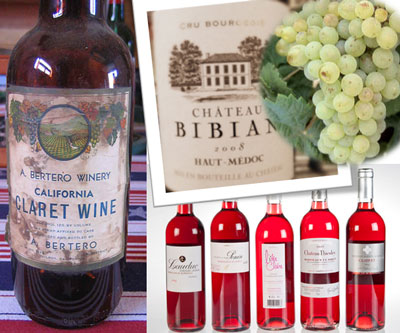VintageTexas Sunday Cyclopedia of Wine: Clairette, Clairet, Claret & Clarete
One of the things that often makes wine a field high on the geek-a-tude index is its plethora of wine terms and especially those that have similar yet importantly different spellings and meanings, and that derived from European geography and language. Here is a great example of what I’m talking about: Clairette, Clairet, Claret and Clarete. They look harmless enough and it you say them with an east Texas twang, they may even all sound similar or be generally indistinguishable. But, in fact, these terms are pronounced differently and have very different origins and meanings.
First, let’s start with the third one – Claret (pronounced as it is spelled – “Clar” with a hard “et” on the end just like any self-respecting English-speaker would say it); and for good reason. The term developed in England where Claret traditionally refers to a good quality red Bordeaux, all dark and full bodied. In fact, a number of American wineries and UK wine merchants currently market their red Bordeaux-style wines as Clarets. However, in many parts of the world other than England, Claret can interestingly refer to a light-bodied red wine. This is in contrast to the the usual UK connotation of Claret being of substantial body and color. Until the United States accepted the EU convention for established product and “place” names, a Claret wine made and marketed in the US could be just about any red wine even if it didn’t have a lick of any of the common Bordeaux grapes in it. Most likely, it would have been made from Barbara or Ruby Cabernet or a blend of red something. But, today the term Claret is most commonly used per the UK convention (as referring to a full bodied Bordeaux style red wine) even though in France this term has no meaning or legal status.
Next up is Clarete (pronouced Clah-reh-teh). This is a term similar to that of Claret in many parts of the world when referring to light-bodied red wine. However, in this case, the term is used especially in the Rioja district of Spain. Like the term Claret, Clarete also has no official meaning or status.
Now, let’s focus on Clairette (pronounced Clair-et, again a hard “et” on the end). In this case, Clairette doesn’t even refer to a red wine of any sort. It is a white grape grown in the southern parts of France and it is prone to making neutral, low acid and rather short lived wines. Clairette is one of the grape varieties used in white blends in the Rhone Valley of France made (with limitations) of Cote du Rhone and Chateauneuf du Pape wines. It is also widely planted in the southwestern wine growing region of France called Languedoc-Roussillon.
There, thus far it all seems so easy. But, we almost forgot the word Clairet (pronounced Cleh-ray).
Clairet is actually the old French term from which the English word Claret was derived, but then referring to the rather light red wines of Bordeaux which were actually more common back in the olden days than they are today. Just to make matters worse and somewhat confusing, the term Clairet made a modern-day return in the mid-1900s being applied to specially vinified light red wines from Bordeaux that were also light in tannin and made to drink young (more like full-bodied Rosés) and served cool.
There you got it and your now ready to impress your friends. Enjoy!


I enjoyed reading this simple explanation describing the differences between Clairette, Clairet, Claret and Clarete. I will be sharing this with my students. Thanks Russ!
Thanks.
As an anglophile, understanding the origin of Claret was useful. In fact, my husband Sean is working on a game (I am helping) where Claret will play a large role — the game will be set in Regency England when Claret was extremely popular. Thanks for the insight; it will be most useful.